Wednesday, 17 June 2009
 WEDNESDAY, JUNE 17, 2009. “No summer election as Harper, Ignatieff reach deal” is the headline for a Canadian Press story run in the Halifax Chronicle Herald today. Yahoo Canada is carrying a later revised version, re-titled “MPs brace for fall election as summer vote averted.” Other variations include “Harper and Ignatieff reach deal” (Globe and Mail), “Harper, Ignatieff agree to study EI reform” (Vancouver Sun), “Election talk put off till fall” (Toronto Star), “Le huis clos s'étire à Ottawa” (Le Devoir in Montreal), and “Canada avoids summer election” (Associated Press, in both the Washington Post and the San Francisco Chronicle). However you write the headline, probably the best spin for Liberal leader Michael Ignatieff is that the election-saving deal just may mark the beginning of some constructive fresh evolution of Canadian federal political culture, to fit a new age of minority government that is arguably not going away any time soon. This is not the way many in Ottawa want to tell the story right now. But history could show that Ignatieff had the last laugh when he said: “We have found a way ... to make this government accountable and I feel that this is a good day for our country ... more importantly, it's a good day also for this system of Parliament.” (Well ... “this system of Parliament” is not elegant language, in the style-is-the-man of Pierre Trudeau: but it does nonetheless make a potentially crucial point!) WEDNESDAY, JUNE 17, 2009. “No summer election as Harper, Ignatieff reach deal” is the headline for a Canadian Press story run in the Halifax Chronicle Herald today. Yahoo Canada is carrying a later revised version, re-titled “MPs brace for fall election as summer vote averted.” Other variations include “Harper and Ignatieff reach deal” (Globe and Mail), “Harper, Ignatieff agree to study EI reform” (Vancouver Sun), “Election talk put off till fall” (Toronto Star), “Le huis clos s'étire à Ottawa” (Le Devoir in Montreal), and “Canada avoids summer election” (Associated Press, in both the Washington Post and the San Francisco Chronicle). However you write the headline, probably the best spin for Liberal leader Michael Ignatieff is that the election-saving deal just may mark the beginning of some constructive fresh evolution of Canadian federal political culture, to fit a new age of minority government that is arguably not going away any time soon. This is not the way many in Ottawa want to tell the story right now. But history could show that Ignatieff had the last laugh when he said: “We have found a way ... to make this government accountable and I feel that this is a good day for our country ... more importantly, it's a good day also for this system of Parliament.” (Well ... “this system of Parliament” is not elegant language, in the style-is-the-man of Pierre Trudeau: but it does nonetheless make a potentially crucial point!)
The crux of the deal ...
 The first Canadian Press report in the Halifax Chronicle Herald does a tidy enough job of summarizing the essential details: “Prime Minister Stephen Harper and Liberal Leader Michael Ignatieff ended their political brinkmanship Wednesday with a deal to avoid an election — at least until the fall ... The centrepiece of the agreement is a six-member working group [three Conservative and three Liberal appointees] that will examine possible changes to Employment Insurance ... Those changes include a Conservative proposal to extend EI coverage to the self-employed, and a Liberal push to make the eligibility threshold the same across the country. The first Canadian Press report in the Halifax Chronicle Herald does a tidy enough job of summarizing the essential details: “Prime Minister Stephen Harper and Liberal Leader Michael Ignatieff ended their political brinkmanship Wednesday with a deal to avoid an election — at least until the fall ... The centrepiece of the agreement is a six-member working group [three Conservative and three Liberal appointees] that will examine possible changes to Employment Insurance ... Those changes include a Conservative proposal to extend EI coverage to the self-employed, and a Liberal push to make the eligibility threshold the same across the country.
“The group will have to report back to Parliament by Sept. 28 ... The minority Conservative government will also be compelled to produce another economic report card to the House of Commons that week ... And Harper agreed to give the Liberals an opposition day motion within eight days of the start of the fall session of Parliament — a key opportunity to trigger an election ... In exchange, Ignatieff will not vote against the government Friday when the supplementary budget estimates come up in the Commons. The NDP and Bloc Quebecois have said they will vote against the government.” (And for those who may have forgotten, the Associated Press story in the US does a nice job of summarizing the crucial parliamentary numbers: “The three opposition parties hold 163 seats in Parliament, while the Conservatives have 143 and there is one independent.” The bare majority needed to pass legislation — and/or keep the Conservative minority government in office — is 154 votes.)
Is this all just giving the Liberals a bit more time to get ready for a fall election?
 Some may remember that employment insurance (or unemployment insurance, as they still more forthrightly say in the USA) was only one of four concerns that Liberal leader Michael Ignatieff raised at the start of this week. The other three were “infrastructure spending, deficit spending and the current medical isotope shortage.” Some may remember that employment insurance (or unemployment insurance, as they still more forthrightly say in the USA) was only one of four concerns that Liberal leader Michael Ignatieff raised at the start of this week. The other three were “infrastructure spending, deficit spending and the current medical isotope shortage.”
You could say that the Conservative minority government has already responded to these other three concerns, in various more general ways. Or you could say that the real crux of the current exercise is to find some way of making Mr. Harper’s minority government work to take account of some kind of majority in Parliament — which is how parliamentary democracy is supposed to work. And the Conservative-Liberal working group on employment insurance (EI) is a kind of experiment in this connection. If it can come up with results that both parties like by the fall, then, presumably, some similar methodology could be extended to other issues — and the second Harper minority government might be able to last into, say 2010.
On the other hand, if the working group just turns out to be window dressing — and the Conservatives continue to brag like schoolyard bullies that the “Liberals have reversed themselves on EI reform (their 360-hour demand has been abandoned) and withdrawn the threat to force an unnecessary summer election ... Instead, the Liberals will vote for the next round of stimulus in our Economic Action Plan” — then there will be an opportunity for the Liberals to try to convince the NDP and the BQ to join them in bringing down the Harper minority government this fall. And then, maybe, we the Canadian people will be able to shuffle the cards yet again in yet another federal election, to see if we can finally elect a parliament that will give us three or four years of stable government at last. Or something like that.
The point is that we have now had three Canadian federal elections in 2004, 2006, and 2008. They have each produced minority governments unable to achieve some kind of stable governing majority in Parliament. As widely observed, this seems the result of two factors in current Canadian politics — the allegedly sovereigntist Bloc Quebecois in Quebec, plus the “united right” Conservative Party of Canada that Mr. Harper himself has been so instrumental in achieving. (And one might add a factor of much greater longevity: the division of the anglophone left into Liberals and New Democrats, dating back to the last Great Depression of the 1930s.)
It now seems increasingly arguable that until one of these factors changes, no party is going to be able to achieve a majority government in a Canadian federal election. (Jean Chretien only managed this trick after the rise of the Bloc Quebecois, in the wake of the failure of the Meech Lake Accord in 1990, because the Canadian right by the 1990s had also become temporarily divided into the Reform Party and the old Progressive Conservatives.)
The best face on what the great or maybe-not-so-great Canadian political newcomer Michael Ignatieff has done over the past several weeks is that he has focused on somehow trying to resolve this very real and quite new and even perhaps unprecedented minority-government issue in Canadian federal politics. And he has perhaps rather awkwardly stumbled into a “parliamentary working-group” approach that may qualify as at least the beginnings of some kind of much-needed fresh wisdom in Ottawa.
If Stephen Harper can’t see this for what it is, and somehow pick up the ball and try to make the working group really work, then maybe there will be yet another Canadian federal election this fall — and the increasingly obvious problem chronology will go 2004, 2006, 2008, 2009. And then perhaps, if the current polling numbers hold up, Mr. Ignatieff will win his own Liberal minority government. And he will have to start applying the working group strategy that failed with Mr. Harper to some new arrangement, with Mr. Layton and the New Democrats (or in principle, but shurely not in practice, with the BQ and Gilles Duceppe?)!
Whatever else, it is all very interesting, for we minority political junkies if no one else. And who knows? At last there just may be some still quite dim light at the end of the tunnel.
Earlier report, June 15: IS THE CBC AT ISSUE PANEL WRONG ABOUT MICHAEL IGNATIEFF .. the answer may be yes?
 MONDAY, JUNE 15. 11:30 PM EDT. [UPDATED JUNE 16].The first thing to say about the current Ottawa teapot tempest over a potential summer election in Canada is that, judging from the visitor statistics on our website here, most Canadians are not at all interested. (And these statistics are backed up by a new Canadian Press Harris-Decima survey, which "says only 14% of respondents want an election," although 41% "said an election is extremely, very, or somewhat likely, while a thin majority of 51% said a summer election was not very or not at all likely.") We three among the larger editorial group have taken up the challenge of monitoring the process anyway. And we continue to press on — no matter how few excellent readers are reading. MONDAY, JUNE 15. 11:30 PM EDT. [UPDATED JUNE 16].The first thing to say about the current Ottawa teapot tempest over a potential summer election in Canada is that, judging from the visitor statistics on our website here, most Canadians are not at all interested. (And these statistics are backed up by a new Canadian Press Harris-Decima survey, which "says only 14% of respondents want an election," although 41% "said an election is extremely, very, or somewhat likely, while a thin majority of 51% said a summer election was not very or not at all likely.") We three among the larger editorial group have taken up the challenge of monitoring the process anyway. And we continue to press on — no matter how few excellent readers are reading.
Tomorrow Conservative minority Prime Minister Stephen Harper and Liberal official opposition leader Michael Ignatieff will be holding a rare meeting, to see if yet another federal election — only some nine or 10 months after the last one — can be avoided. (Now, as of 5 PM EDT, June 16, they have apparently had one meeting and scheduled another!) Meanwhile, we are still wondering about the At Issue panel’s judgment, on CBC news, that Ignatieff put in a notably weak performance on this front Monday, June 15. We are not avid followers of the CBC At Issue panel. But we watch it on what seem to be crucial occasions, and certainly have respect for its often wise political assessments. Yet we`d give Mr. Ignatieff considerably higher marks than they have this time. We are not among his fans. He is not the usual Canadian politician. But that could be one of his strengths.
* * * *
 The thrust of the At Issue panel’s critique seemed to be that Michael Ignatieff climbed up on a pretty big horse this morning — about how if the Harper government didn’t do this, this, and that, the Liberals were going to bring them down this coming Friday. But then Harper started hitting back. Ignatieff started looking weak. And Ignatieff had to just keep backpeddling and backpeddling, on and on. The thrust of the At Issue panel’s critique seemed to be that Michael Ignatieff climbed up on a pretty big horse this morning — about how if the Harper government didn’t do this, this, and that, the Liberals were going to bring them down this coming Friday. But then Harper started hitting back. Ignatieff started looking weak. And Ignatieff had to just keep backpeddling and backpeddling, on and on.
It seemed to us, however, that Ignatieff started out quite mushy this morning, right at the beginning. He doesn’t want an election — not because he is afraid of one, but because most of the Canadian people don’t want an election, and he listens to the Canadian people.
 At the same time, he has a job to do — to hold the government to account, and to help Mr. Harper realize at last that he has only a minority government, and needs to co-operate with the majority in Parliament to make his minority government work. At the same time, he has a job to do — to hold the government to account, and to help Mr. Harper realize at last that he has only a minority government, and needs to co-operate with the majority in Parliament to make his minority government work.
More politically, in the raw sense, of course, the Liberals can’t just keep on voting to keep the Harper minority government in office, and then credibly criticize them in the next election, whenever it comes. Ignatieff is trying to navigate these tricky waters, while continuing to criticize a government that can certainly stand criticism, on various fronts.
He seems to be reading his Mackenzie King: an election if necessary, but not necessarily an election, etc, etc. As the historian Frank Underhill finally admitted long ago, while the At Issue panelists of an earlier Canada never had much respect for Mackenzie King, he was the “Canadian as he exists in the mind of God,” and lasted for a very long while in Ottawa.
 From what we saw of Michael Ignatieff today, at least our respect for him and his evolving political talents increased somewhat. It may well be that the At Issue panel is right, on the other hand (of course), and this will be a very bad week for the Liberal Party of Canada. But if that is not how the world looks when this coming Friday finally arrives, and if Mr. Ignatieff himself finally does seem to look considerably better then than the At Issue panel is saying now, remember: you heard it here first — whatever it may finally prove to be. From what we saw of Michael Ignatieff today, at least our respect for him and his evolving political talents increased somewhat. It may well be that the At Issue panel is right, on the other hand (of course), and this will be a very bad week for the Liberal Party of Canada. But if that is not how the world looks when this coming Friday finally arrives, and if Mr. Ignatieff himself finally does seem to look considerably better then than the At Issue panel is saying now, remember: you heard it here first — whatever it may finally prove to be.
(Well, not exactly. Check out, e.g., these two comparatively fresh items from the Globe and Mail: “Ignatieff shows some common sense” and “Election if necessary, but not necessarily an election.” And then, on a hasty June 16 update, note "Kelly McParland: Election talk sparks pundit chaos" in the National Post, and "Win-win territory for Ignatieff's Liberals," by James Travers in the Toronto Star. Hmmm ... it's too bad there aren't more voters actually interested in all this.)
Earlier report, June 15: YOU HEARD IT THERE FIRST .. Ignatieff renonce à des élections cet été
 MONDAY, JUNE 15, 2009. At 10 AM EDT this morning the Toronto Star was telling us that the “Liberal caucus is meeting at 10 a.m. today and Ignatieff will announce his decision publicly an hour later.” The Vancouver Sun was still running an article from yesterday, headlined “Liberal decision over economic report expected Monday.” It was left to the first people who called themselves Canadians to bust the big scoop first. MONDAY, JUNE 15, 2009. At 10 AM EDT this morning the Toronto Star was telling us that the “Liberal caucus is meeting at 10 a.m. today and Ignatieff will announce his decision publicly an hour later.” The Vancouver Sun was still running an article from yesterday, headlined “Liberal decision over economic report expected Monday.” It was left to the first people who called themselves Canadians to bust the big scoop first.
At 10 AM EDT this morning Le Devoir in Montreal was already confidently announcing that “Après trois jours de réflexion, le chef libéral, Michael Ignatieff, a décidé de ne pas déclencher d'élections cet été. Il annoncera aujourd'hui que son parti appuiera, à contrecoeur, le gouvernement Harper lors du vote de confiance sur les crédits budgétaires cette semaine, a appris Le Devoir de sources sûres.” I.e., Mr. Ignatieff is not going to be calling a summer election (just yet?). The Toronto Star, mind you, had also already reported in more minced words that: “Federal Liberals expect party leader Michael Ignatieff to steer clear of an absolute commitment to bring down Prime Minister Stephen Harper's minority government when he gives his verdict today on the Conservatives' handling of the economic crisis.” But there still could be further high jinks “later this week.” (And for a more detailed report on the actual June 15 Ignatieff press conference, and the initial Harper response, read on!)
Ignatieff press conference June 15 ...
 Just as the Toronto Star prophesied, today’s Michael Ignatieff press conference started pretty much an hour after the Liberal caucus meeting at 10 AM EDT. Le Devoir was similarly right in its prophesy that the Liberal leader would not exactly be calling a summer election. Like everyone else, he said several times, in various ways, he does not want a summer election. He just wants to make the current Parliament work. Just as the Toronto Star prophesied, today’s Michael Ignatieff press conference started pretty much an hour after the Liberal caucus meeting at 10 AM EDT. Le Devoir was similarly right in its prophesy that the Liberal leader would not exactly be calling a summer election. Like everyone else, he said several times, in various ways, he does not want a summer election. He just wants to make the current Parliament work.
For that to happen, however, he believes the Harper Conservative minority government must come up with some better answers on the state of the Canadian universe than they have offered in their recent stimulus package progress report. Ignatieff wants answers on four specific issues. If he doesn’t get them he is (reluctantly of course) prepared to vote against the current budget estimates. And if the other two opposition parties do the same that will of course defeat the government and presumably prompt a fresh election that no one wants.
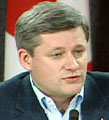 At the same time, Ignatieff is prepared to extend the current House sitting past this coming Friday’s deadline, if that will help the Harper government answer the questions the Liberals believe need answering. And in the opinion of no less an authority than the wily Bloc Quebecois leader Gilles Duceppe, Mr. Harper will not have to twist himself into any impossible pretzel to come up with answers to Mr. Ignatieff’s questions that Mr. Ignatieff will like well enough to keep the minority government in office, for the time being yet again. At the same time, Ignatieff is prepared to extend the current House sitting past this coming Friday’s deadline, if that will help the Harper government answer the questions the Liberals believe need answering. And in the opinion of no less an authority than the wily Bloc Quebecois leader Gilles Duceppe, Mr. Harper will not have to twist himself into any impossible pretzel to come up with answers to Mr. Ignatieff’s questions that Mr. Ignatieff will like well enough to keep the minority government in office, for the time being yet again.
As tidily enough summarized by The Canadian Press: “Michael Ignatieff has thrown down the election gauntlet to Prime Minister Stephen Harper ... The Liberal leader is demanding more information on proposed EI changes, stimulus spending, the country's finances and the medical isotope shortage, to avoid a summer election ... Ignatieff stressed that he doesn't want an election, but added he must hold the government accountable ... He said it's up to Harper to co-operate and provide transparent government.”
 In the somewhat blunter language of Canwest News Service: “Liberal Leader Michael Ignatieff said Monday he is ‘not seeking an election,’ but that he is prepared to bring the government down unless Prime Minister Stephen Harper answers some key questions ... The questions Ignatieff is seeking answers to involve four key issues — employment insurance reforms, infrastructure spending, deficit spending and the current medical isotope shortage.” In the somewhat blunter language of Canwest News Service: “Liberal Leader Michael Ignatieff said Monday he is ‘not seeking an election,’ but that he is prepared to bring the government down unless Prime Minister Stephen Harper answers some key questions ... The questions Ignatieff is seeking answers to involve four key issues — employment insurance reforms, infrastructure spending, deficit spending and the current medical isotope shortage.”
Now we will have to see just what develops from here. What does seem clear enough at the moment is that Mr. Ignatieff’s raw political skills are continuing to develop. He probably has nicely enough tossed the who’s-to-blame-for-this-election-if-there-is-an-election hot potato back into Mr. Harper’s lap. (Former Brian Mulroney aide Norman Spector, e.g., has just written about “watching Michael Ignatieff transfer the onus for precipitating a summer election to the Prime Minister.”) Whatever else, Stephen Harper is finding an increasingly worthy Canadian political opponent in Michael Ignatieff — even if Mr. Ignatieff has spent the last however-many-years-it-is outside Canada.
UPDATE: Monday evening, June 15. For the early response from the Conservative minority government see "Harper invites Ignatieff to rare tete-a-tete before critical vote," by Jennifer Ditchburn of The Canadian Press.
Earlier report, June 13: IS THERE ANY CHANCE AT ALL THAT MICHAEL IGNATIEFF WILL CALL A SUMMER ELECTION?
 SATURDAY, JUNE 13, 2009. According to most deep thinkers in Ottawa the short answer is don’t be ridiculous: of course not. But early last night Jane Taber of the Globe and Mail breathlessly reported: “Stephen Harper and his Tories are on high alert, ready for an election. They have a plane. MPs have been ordered to be in Ottawa next week. While the House of Commons is expected to rise for the summer next Friday, there is a possibility the government could be defeated that day on a confidence vote on its spending estimates ... Doug Finley , the Prime Minister's ... national campaign director, has told people there is a 75-per-cent chance of an election this summer.” SATURDAY, JUNE 13, 2009. According to most deep thinkers in Ottawa the short answer is don’t be ridiculous: of course not. But early last night Jane Taber of the Globe and Mail breathlessly reported: “Stephen Harper and his Tories are on high alert, ready for an election. They have a plane. MPs have been ordered to be in Ottawa next week. While the House of Commons is expected to rise for the summer next Friday, there is a possibility the government could be defeated that day on a confidence vote on its spending estimates ... Doug Finley , the Prime Minister's ... national campaign director, has told people there is a 75-per-cent chance of an election this summer.”
Ms. Taber concluded: “The NDP and Bloc say they will not support the government; Mr. Ignatieff will make up his mind this weekend.” And it is this last thought that rings loudest in your ear, yet again. The summer election decision ultimately rests not with Prime Minister Harper — and certainly not with his fixed-date election bill that is allegedly now the law of the land. In the new Canadian age of perpetual minority government, it is in the hands of the leader of the official opposition. Or at least more or less, perhaps, and depending in part on the not-so-happy-lately Jack Layton, and the wily Gilles Duceppe.
The deeper background ...
 More than 12 hours before Jane Taber’s report, Joan Bryden at The Canadian Press had already laid the essential dynamics of yet another potential federal election very soon (published in the Halifax Chronicle Herald): “The country was left teetering on the brink of election Thursday [June 11] after all three opposition parties denounced the minority Conservative government’s latest progress report on its economic recovery plan ... all opposition parties dismissed Harper’s 80 per cent implementation rate as a joke, particularly when it comes to infrastructure funds that are supposed to provide the most immediate economic stimulus ... And two of the three — the NDP and Bloc Quebecois — vowed to vote against the government next Friday, when the latest round of spending estimates in support of the economic recovery plan are put to a confidence vote ... That left the Harper government’s fate squarely in Michael Ignatieff’s hands.” More than 12 hours before Jane Taber’s report, Joan Bryden at The Canadian Press had already laid the essential dynamics of yet another potential federal election very soon (published in the Halifax Chronicle Herald): “The country was left teetering on the brink of election Thursday [June 11] after all three opposition parties denounced the minority Conservative government’s latest progress report on its economic recovery plan ... all opposition parties dismissed Harper’s 80 per cent implementation rate as a joke, particularly when it comes to infrastructure funds that are supposed to provide the most immediate economic stimulus ... And two of the three — the NDP and Bloc Quebecois — vowed to vote against the government next Friday, when the latest round of spending estimates in support of the economic recovery plan are put to a confidence vote ... That left the Harper government’s fate squarely in Michael Ignatieff’s hands.”
Then, some two hours before Ms. Taber’s item early Friday night, the Toronto Star had carried another updated and unattributed Canadian Press report: “Ignatieff to decide Monday on election ... Liberal leader will take the weekend to decide whether or not to bring the Harper government down ... Insiders close to Ignatieff insist he'll be guided by what's best for the country, not crass political considerations. They say his decision boils down to whether he concludes the economic and health crises will only get worse under the Harper government's continued supervision ... Few Liberals were willing to predict Friday what their leader will decide ... ‘I honestly think it could go either way,’ said one insider.” (For the economic crisis see above, and “EI changes not a sure thing: Finley ... Human Resources Minister suggests Tories could stand pat if economy picks up; Ignatieff to reveal decision on government's plan Monday,” and “Le plan de relance économique — Un optimisme excessif.” For the so-called health crisis, try: “Raitt sets meeting on isotopes for next week,” “Canada to stop producing medical isotopes: Harper,” and “Crise des isotopes — Chalk River n'est qu'un gouffre sans fond aux yeux des conservateurs.”)
 Meanwhile the naysayers had already been lining up for several days, across the country. As early as Tuesday, June 9 the Vancouver Sun ran an editorial headlined: “Time to put some ice on Michael Ignatieff's raging election fever.” On Thursday, June 11 Adam Radwanski at the Globe and Mail advised: “Your quick answer on whether there will be an election: No. Of course not. Next question?” On Friday, June 12 Chantal Hébert at the Toronto Star concluded: “at the end of the day, the real question Ignatieff has to wrestle with is what, if anything, he has to offer that could possibly justify a second election in less than a year ... From all available indications, he is more likely to take the summer to come up with a convincing answer than to plunge Canada in an uncertain campaign.” And then on the same day Don Martin at the Calgary Herald (etc, etc) similarly concluded: “Harper heads off summer election.” Meanwhile the naysayers had already been lining up for several days, across the country. As early as Tuesday, June 9 the Vancouver Sun ran an editorial headlined: “Time to put some ice on Michael Ignatieff's raging election fever.” On Thursday, June 11 Adam Radwanski at the Globe and Mail advised: “Your quick answer on whether there will be an election: No. Of course not. Next question?” On Friday, June 12 Chantal Hébert at the Toronto Star concluded: “at the end of the day, the real question Ignatieff has to wrestle with is what, if anything, he has to offer that could possibly justify a second election in less than a year ... From all available indications, he is more likely to take the summer to come up with a convincing answer than to plunge Canada in an uncertain campaign.” And then on the same day Don Martin at the Calgary Herald (etc, etc) similarly concluded: “Harper heads off summer election.”
The countervailing arguments, as usual, have a lot to do with recent opinion polls. Take just two cases in point from the CBC website: “Minority government possible for Liberals, poll suggests” and “Federal Liberals continue to gain ground: poll ... Support for the Liberals continues to surge, although the federal party would not be guaranteed a victory if an election were held tomorrow, a new EKOS poll suggests ... The poll, commissioned for the CBC and released Thursday, suggests 35% of Canadians would vote Liberal in an election while 30.3% would vote Conservative ... ‘The Liberals certainly have better momentum right now,’ said EKOS president Frank Graves. ‘But you can't say it's a sure bet’ ... He said neither party appears headed for a majority government; a minority would be the most likely outcome of an election.”
Various flies in the ointment ... and on the wall?
 One fly in the ointment for the Ignatieff Liberals is that their growing support remains concentrated in Ontario and points east. The Harper Conservatives still seem to be getting good reviews in Western Canada — and, as the Vancouver Sun editorial above suggests, for all practical purposes that probably does include beautiful BC on Canada’s Pacific Coast. One fly in the ointment for the Ignatieff Liberals is that their growing support remains concentrated in Ontario and points east. The Harper Conservatives still seem to be getting good reviews in Western Canada — and, as the Vancouver Sun editorial above suggests, for all practical purposes that probably does include beautiful BC on Canada’s Pacific Coast.
At the same time, even his long-time Alberta academic supporter Tom Flanagan concedes that Stephen Harper is vulnerable right now (see, e.g. “Harper must rebuild his reputation: Flanagan”). If the economic picture is improving even half as dramatically as Harper government pronouncements have lately suggested, a Liberal leader who waits until the fall to challenge Harper’s vulnerability might find he has waited too long — and might in the process demonstrate that he lacks the required killer instinct to be a proper prime minister of Canada.
Two other wrinkles are worth brief comment:
(1) In fact, of course, the Ignatieff Liberals cannot pull down the current Harper minority government all by themselves. The latest opinion polls also suggest that neither M. Duceppe`s Bloc Quebecois nor Mr. Layton`s New Democrats really have any great incentive to plunge into a summer election. To some serious enough extent, the Liberals’ current strength in the polls is coming at the expense of the other two opposition parties — and especially the NDP. According to Le Devoir: “Gilles Duceppe maintient qu'il défendra les intérêts du Québec en votant contre les crédits budgétaires, lundi, à Ottawa, même si cela aura pour conséquence de déclencher des élections en plein été.” But there is some evidence that the Layton New Democrats are prepared to make a deal for propping up the Harper Conservatives a while longer yet, probably over employment insurance (?).
There also seems some evidence that Mr. Harper is just not interested. But it nonetheless appears at least a very vague possibility that even if Michael Ignatieff were to decide to vote against the budget legislation over the week of June 15–19, the Harperian bacon could still finally be saved by a deal with the devil between the alleged extreme right and extreme left of Canadian federal politics. (And if this did happen it wouldn’t be the first time. It was Mr. Layton, many of us would argue, who gave Mr. Harper his first minority government way back when!)
(2) Finally, the Wikipedia article on the subject notes that on “November 6, 2006, the Parliament of Canada passed Bill C-16, An Act to Amend the Canada Elections Act. It requires that each general election is to take place on the third Monday in October, in the fourth calendar year after the previous poll, starting with October 19, 2009.” There seems some consensus among Ottawa deep thinkers at the moment that, if there isn’t a fresh federal election this summer, there probably will be one this coming fall. (Parliament does seem to remain that unstable, and Mr. Harper still seems uninterested in becoming the kind of prime minister who could ensure greater stability by a warmer embrace of the Canadian tradition of compromise, etc, etc.) This may in some minds raise the question of whether the fixed election starting date of October 19, 2009 under the old Bill C-16 — i.e. this coming October 19 — remains in force?
 For better or worse, this prospect does seem more or less cancelled by the subsequent reporting on the same Wikipedia site (which is of course not exactly authoritative, but certainly worth considering?): “Parliamentary expert and Queen's University political science professor Ned Franks maintains that, despite the new legislation, under the Parliament of Canada Act the prime minister is still free to request an election at any time, and that provincial fixed-term statutes contain the same exception. It is unclear how much consideration a Governor General or Lieutenant Governor must give to such a request, particularly in the case of a minority government, given the fixed date election law. However, this view appears to have been vindicated by the dissolution of the Parliament of Canada, at the request of Prime Minister Stephen Harper, on 7 September 2008. In effect, the ‘fixed-date’ law changed only the maximum duration of a Parliament, by ensuring that it ends no later than October in its fourth calendar year after commencement, but the law leaves the possibility of an earlier end unaffected.” For better or worse, this prospect does seem more or less cancelled by the subsequent reporting on the same Wikipedia site (which is of course not exactly authoritative, but certainly worth considering?): “Parliamentary expert and Queen's University political science professor Ned Franks maintains that, despite the new legislation, under the Parliament of Canada Act the prime minister is still free to request an election at any time, and that provincial fixed-term statutes contain the same exception. It is unclear how much consideration a Governor General or Lieutenant Governor must give to such a request, particularly in the case of a minority government, given the fixed date election law. However, this view appears to have been vindicated by the dissolution of the Parliament of Canada, at the request of Prime Minister Stephen Harper, on 7 September 2008. In effect, the ‘fixed-date’ law changed only the maximum duration of a Parliament, by ensuring that it ends no later than October in its fourth calendar year after commencement, but the law leaves the possibility of an earlier end unaffected.”
It remains another of Mr. Harper’s current vulnerabilities, that is to say, that he in effect cancelled his own first fixed election date himself. And this may even remind some Canadian voters that their current prime minister has already quite shamefully gone down in history as someone who can trigger the following headline in the contemporary press of the ancient home of the Mother of Parliaments: “Gordon Brown could always do a Canada and close parliament.” (Which continues to make some of us in central Canada feel that whenever the next federal election comes, it certainly will be a great shame if Stephen Harper winds up as prime minister at the end of things yet again — regardless of how much support he has out West. And these days even Tom Flanagan from Alberta almost seems to be agreeing with us?)
Earlier report, April 29: THINKING BIG ABOUT CANADA .. can Ignatieff’s new-look Liberals do it? .. (probably not?)
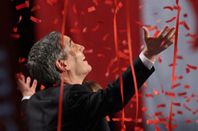 UPDATED MAY 4. This coming Thursday, April 30 to Saturday, May 2 “Liberals from across Canada will gather in Vancouver to ratify a new leader and vote on new policy initiatives for the Liberal Party.” According to the Vancouver Sun: “Buoyed by positive polls and poised to pay off the last of the party's campaign debt, Liberals are claiming momentum.” What’s more, their current acting and soon-to-be-ratified leader Michael Ignatieff (Iggy to his friends, some still say) “when promoting his new book, True Patriot Love ... has emphasized a desire to encourage people to ‘think big’ about Canada.” Except no federal (or even provincial?) politician of any party has really thought big about Canada in 25 years. What makes Mr. Ignatieff, or anyone else, think the Liberals can do it now? A realistic analyst is almost bound to look at the Canadian scene today and report this is still a place that deliberately thinks small — in both official languages and from coast to coast to coast. What virtues we have, some even seem to argue, actually flow from such habits. We have made Small Is Beautiful an article of faith. And yet there remain vague yearnings to broaden our horizons, if only we knew how. At least some of us even have some sense that if we don`t start trying to think bigger soon, we just won`t make it through the challenging new century that lies ahead. [SEE BELOW FOR MAY 4 UPDATE]. UPDATED MAY 4. This coming Thursday, April 30 to Saturday, May 2 “Liberals from across Canada will gather in Vancouver to ratify a new leader and vote on new policy initiatives for the Liberal Party.” According to the Vancouver Sun: “Buoyed by positive polls and poised to pay off the last of the party's campaign debt, Liberals are claiming momentum.” What’s more, their current acting and soon-to-be-ratified leader Michael Ignatieff (Iggy to his friends, some still say) “when promoting his new book, True Patriot Love ... has emphasized a desire to encourage people to ‘think big’ about Canada.” Except no federal (or even provincial?) politician of any party has really thought big about Canada in 25 years. What makes Mr. Ignatieff, or anyone else, think the Liberals can do it now? A realistic analyst is almost bound to look at the Canadian scene today and report this is still a place that deliberately thinks small — in both official languages and from coast to coast to coast. What virtues we have, some even seem to argue, actually flow from such habits. We have made Small Is Beautiful an article of faith. And yet there remain vague yearnings to broaden our horizons, if only we knew how. At least some of us even have some sense that if we don`t start trying to think bigger soon, we just won`t make it through the challenging new century that lies ahead. [SEE BELOW FOR MAY 4 UPDATE].
UPDATE: MAY 4. Judging from a quick rush at the websites of major Canadian dailies, from the Atlantic to the Pacific, on the Monday morning after there was more interest in this past weekend’s Vancouver Liberal convention in Ontario and Quebec than in the more easterly East or the West (to say nothing of the far North).
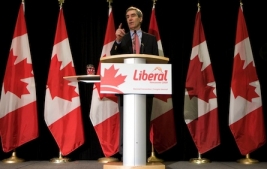 At the convention itself there was some slight and ultimately ineffectual bow to at least one of the issues we discussed earlier below. As reported by the Canadian Press, in the grass-roots policy debate that formed the key preoccupation of convention delegates there were various “potentially controversial resolutions that didn't make it past riding presidents, including motions calling for the legalization of assisted suicide, eliminating the monarchy and financial penalties for provinces that refuse to fund abortions.” At the convention itself there was some slight and ultimately ineffectual bow to at least one of the issues we discussed earlier below. As reported by the Canadian Press, in the grass-roots policy debate that formed the key preoccupation of convention delegates there were various “potentially controversial resolutions that didn't make it past riding presidents, including motions calling for the legalization of assisted suicide, eliminating the monarchy and financial penalties for provinces that refuse to fund abortions.”
Outside the convention, there was some further big-thinking action on the streets, over an issue that we did not discuss below, but that we do think makes a lot of sense — even if only the Green Party in BC seems to be taking it seriously at the moment. As reported in Saturday’s Vancouver Sun: “Pot protesters gather and march on Liberal convention. ... The group hopes to draw the attention of new Liberal party leader Michael Ignatieff when it marches to the Vancouver Trade and Convention Centre at 2 p.m. where the Liberal Party of Canada is meeting ... ‘I hope Michael Ignatieff pays attention to the polls,’ said event organizer Jacob Hunter, a pro-cannabis activist ... Hunter was referring to a recent Angus Reid poll that said 65 per cent of British Columbians support legalizing the Maui wowie to curb violence related to the drug trade.”
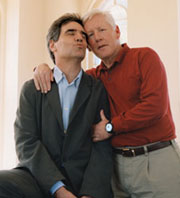 Meanwhile, former leader Jean Chretien and former leadership candidate Bob Rae apparently gave feisty convention speeches, in keeping with the party’s new mood of optimism. The newly crowned leader Michael Ignatieff’s speech drew a predictable ho-hum from conservative commentator Andrew Coyne at Maclean’s: “It’s clear that Ignatieff intends to ignore mounting media calls to spell out in detail what he stands for. And it’s equally clear from today’s speech that he doesn’t think he needs to ... What he seems to have decided ... is that the ‘longing for change’ he detects in the public is not necessarily about a change of direction, but a change of tone ... So Ignatieff’s speech promise[d] little more than a more uplifting style of politics, emphasizing patriotism, a national vision, and less overt partisanship — all calculated to play to Harper’s perceived weak points. ‘A new politics,’ he puts it, ‘that replaces spite and spin with civility and common purpose.’” (Well, someone less fundamentally sympathetic to Mr. Harper than Mr. Coyne might ask, why not?) Meanwhile, former leader Jean Chretien and former leadership candidate Bob Rae apparently gave feisty convention speeches, in keeping with the party’s new mood of optimism. The newly crowned leader Michael Ignatieff’s speech drew a predictable ho-hum from conservative commentator Andrew Coyne at Maclean’s: “It’s clear that Ignatieff intends to ignore mounting media calls to spell out in detail what he stands for. And it’s equally clear from today’s speech that he doesn’t think he needs to ... What he seems to have decided ... is that the ‘longing for change’ he detects in the public is not necessarily about a change of direction, but a change of tone ... So Ignatieff’s speech promise[d] little more than a more uplifting style of politics, emphasizing patriotism, a national vision, and less overt partisanship — all calculated to play to Harper’s perceived weak points. ‘A new politics,’ he puts it, ‘that replaces spite and spin with civility and common purpose.’” (Well, someone less fundamentally sympathetic to Mr. Harper than Mr. Coyne might ask, why not?)
Coming out of the convention the potential big news (if not really big thinking) would seem to be that Mr. Ignatieff is planning to stand up boldly for common unemployment insurance (or, if you insist, employment insurance) standards across the country. And if Mr. Harper’s minority government is not prepared to buy into this crusade, well then Mr. Ignatieff just might have to precipitate a fresh federal election. (Ho-hum again, some among us will say: including the participants in a May 4 Yahoo Canada poll, 78% of whom answered “No” to the question: “Should the new Liberal leader trigger an election?”)
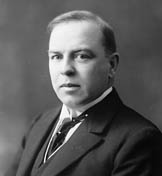 For some details here see: “Liberals prep for June election ... Ignatieff demands Tories make 'urgent' fixes to employment insurance or face the voters” ; “Ignatieff hints at election timing ... Liberal leader Michael Ignatieff will have a “coherent” Liberal platform ready by June. And—if Harper doesn’t make immediate reforms to the country’s Employment Insurance system—he’ll consider revoking the lifeline the Liberals handed the prime minister in January” ; and “Ignatieff: priorité aux chômeurs ... Couronné par les militants, le nouveau chef du PLC propose une réforme de l'assurance-emploi.” For some details here see: “Liberals prep for June election ... Ignatieff demands Tories make 'urgent' fixes to employment insurance or face the voters” ; “Ignatieff hints at election timing ... Liberal leader Michael Ignatieff will have a “coherent” Liberal platform ready by June. And—if Harper doesn’t make immediate reforms to the country’s Employment Insurance system—he’ll consider revoking the lifeline the Liberals handed the prime minister in January” ; and “Ignatieff: priorité aux chômeurs ... Couronné par les militants, le nouveau chef du PLC propose une réforme de l'assurance-emploi.”
 At the same time, Liberal activists, inside and outside the Ottawa Parliament, are apparently split on the wisdom — or even the practical possibility — of any early federal election. According to one senior Liberal MP: “This [Harper minority] government could last a lot longer than expected. I mean 2010 and possibly 2011. There are people that want to go as early as June. They are not factoring in the [Bloc Québécois'] and NDP's lack of desire to have an election.” On the other hand, Chantal Hébert at the Toronto Star points out that if it did finally come “to a showdown, EI is one issue on which the NDP and the Bloc Québécois are unlikely to save the government. The Liberals' proposals may not go as far as their own demands but they do amount to a change all opposition parties have been calling for.” At the same time, Liberal activists, inside and outside the Ottawa Parliament, are apparently split on the wisdom — or even the practical possibility — of any early federal election. According to one senior Liberal MP: “This [Harper minority] government could last a lot longer than expected. I mean 2010 and possibly 2011. There are people that want to go as early as June. They are not factoring in the [Bloc Québécois'] and NDP's lack of desire to have an election.” On the other hand, Chantal Hébert at the Toronto Star points out that if it did finally come “to a showdown, EI is one issue on which the NDP and the Bloc Québécois are unlikely to save the government. The Liberals' proposals may not go as far as their own demands but they do amount to a change all opposition parties have been calling for.”
So the great media debate on when the next federal election is going to be (a subject which clearly seems not to interest most of the Canadian people, or so it would appear right now, at any rate) goes on, and on, and on. Big thinking is not really on anyone’s agenda, alas. Or so it would seem. And for further more practical political intelligence, see, e.g.: “Ignatieff crowned Liberal leader, accuses PM of failing to unite Canada” ; “Canada Liberals hold edge on ruling Tories in poll” ; “Harper to Liberals: don't trigger election now” ; and “Harper denies talk of pact with separatists.” So stay tuned. Or (perhaps still better advice?) grin and bear it!. The summer will be coming soon, with or without yet another federal election. And we can all get lost in one or another version of the magnificent lakes and woods of the northern forest, from coast to coast to coast.
EARLIER REPORT: APRIL 29.
Ocean to ocean: thinking big on geography ... Lysiane Gagnon on Ignatieff’s new book about his mother’s family ...
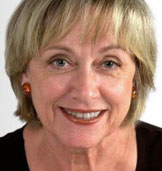 Lysiane Gagnon, who has been trying to explain politics and society in francophone Quebec to anglophone readers of the Toronto Globe and Mail for a few decades now, had an interesting and somewhat different recent column on the leader whom Liberals from across Canada are gathering in Vancouver to ratify (“An atypical politician with a pen,” April 27). Lysiane Gagnon, who has been trying to explain politics and society in francophone Quebec to anglophone readers of the Toronto Globe and Mail for a few decades now, had an interesting and somewhat different recent column on the leader whom Liberals from across Canada are gathering in Vancouver to ratify (“An atypical politician with a pen,” April 27).
The column is focused on Ms. Gagnon’s reading of Michael Ignatieff’s new book, True Patriot Love. This tells the story of his mother’s side of his family: the various distinguished Grants, from George Monro Grant, who wrote Ocean to Ocean: Sanford Fleming’s Expedition Through Canada in 1872, to George Parkin Grant, who wrote Lament for a Nation: The Defeat of Canadian Nationalism, first published in 1965.
(As Ms. Gagnon also notes, in a book called The Russian Album Mr. Ignatieff had earlier told what she regards as the more “delightful” and “gripping” story of his father’s side of the family — “the extraordinary lives of Russian aristocrats who played a prominent role in czarist Russia before taking the painful road of exile” to Canada, where Michael Ignatieff’s father in due course became an influential federal civil servant.)
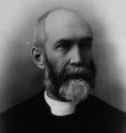 Not surprisingly, Lysiane Gagnon’s book report on the current True Patriot Love tells us that: “The story of the Grants — public intellectuals who in different eras and in different ways were obsessed with the destiny of Canada — is tailored for a politician who wants to be prime minister of Canada. Mr. Ignatieff wants to be seen as their inheritor, the one who will give Canada the prominent role his ancestors dreamed of ... This book is also, obviously, a way to show off his ‘roots’ — a response to those who reproach him [for?] his 30-year absence from Canada. Mr. Ignatieff started the book six years before his jump into politics, but the introduction and the afterword, written recently, are filled with political clichés and sanctimonious pronouncements. (Granted, they are more readable than the usual political ‘manifesto.’)” Not surprisingly, Lysiane Gagnon’s book report on the current True Patriot Love tells us that: “The story of the Grants — public intellectuals who in different eras and in different ways were obsessed with the destiny of Canada — is tailored for a politician who wants to be prime minister of Canada. Mr. Ignatieff wants to be seen as their inheritor, the one who will give Canada the prominent role his ancestors dreamed of ... This book is also, obviously, a way to show off his ‘roots’ — a response to those who reproach him [for?] his 30-year absence from Canada. Mr. Ignatieff started the book six years before his jump into politics, but the introduction and the afterword, written recently, are filled with political clichés and sanctimonious pronouncements. (Granted, they are more readable than the usual political ‘manifesto.’)”
At the same time, you cannot help feeling that Ms. Gagnon somehow approves of Mr. Ignatieff. He is, after all, “an atypical politician given that he lives in a country where politicians don't write. This is a sharp contrast with France, where any respectable political figure feels obliged to publish more than one book. The rare books authored by our political leaders were written by professionals hired for the job.”
Of course, this is not entirely true. The most legendary Canadian federal politician of an earlier age, William Lyon Mackenzie King (“conscription if necessary, but not necessarily conscription”) was also the author of a ponderous volume called Industry and Humanity. Much more to the point, as Ms. Gagnon herself stresses: “The only genuine intellectual to lead a political party in Canada was Pierre Trudeau, whose earlier political essays were masterworks.”
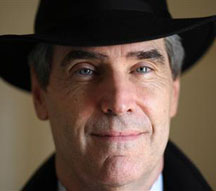 The vague notion that the “public intellectual” Michael Ignatieff is at least some kind of successor to Pierre Trudeau has certainly been part of Mr. Ignatieff’s appeal, to both those Liberal Party of Canada insiders and those Canadian voters at large who do find him appealing. And, say whatever else you like about Pierre Trudeau, he is also the effective author of one of the few authentically big things that has happened in Canada since the Second World War — the Constitution Act 1982, which “patriated” the Canadian Constitution from the United Kingdom at long last, and gave us the Canadian Charter of Rights and Freedoms: virtually the only seriously distinguished element in our current collection of Canadian constitutional documents. The vague notion that the “public intellectual” Michael Ignatieff is at least some kind of successor to Pierre Trudeau has certainly been part of Mr. Ignatieff’s appeal, to both those Liberal Party of Canada insiders and those Canadian voters at large who do find him appealing. And, say whatever else you like about Pierre Trudeau, he is also the effective author of one of the few authentically big things that has happened in Canada since the Second World War — the Constitution Act 1982, which “patriated” the Canadian Constitution from the United Kingdom at long last, and gave us the Canadian Charter of Rights and Freedoms: virtually the only seriously distinguished element in our current collection of Canadian constitutional documents.
However you look at it, it also seems indisputable that the jury is inevitably still out on whether Michael Ignatieff can or could ever match Pierre Trudeau as a leader who does big things in Canadian federal politics. In some ways, e.g., Trudeau could almost be said to have combined the essential qualities (and backgrounds) of both Stephen Harper and Michael Ignatieff today. (Or, along with what Michael Ignatieff has, Trudeau also had something that Stephen Harper has and that Mr. Ignatieff lacks?) Lysiane Gagnon makes a perhaps related but still somewhat different point in the conclusion to her Globe and Mail column: “Mr. Trudeau was a Cartesian thinker, with a dry, slightly cynical turn of mind. He could write splendid essays but he would never have thought of writing ... a story about his family. Mr. Ignatieff is another sort of writer — more imaginative, more romantic. Perhaps too much for his own good, now that he's left the world of ideas and emotions for the hard field of politics. We'll see.”
Thinking big on trade ... growing away from the USA????
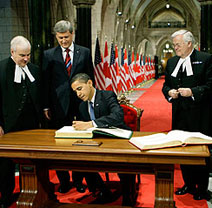 Another Globe and Mail columnist, Jeffrey Simpson, has lately been worrying about how Canada’s “dependence on the United States ... is great and growing, for better or worse ... In fields from border security to trade, from energy and the environment to Afghanistan, from economic recovery to university research, we Canadians are now following along or simply dependent on what happens in America..” Another Globe and Mail columnist, Jeffrey Simpson, has lately been worrying about how Canada’s “dependence on the United States ... is great and growing, for better or worse ... In fields from border security to trade, from energy and the environment to Afghanistan, from economic recovery to university research, we Canadians are now following along or simply dependent on what happens in America..”
A week or so ago (on April 20, it turns out, our attractive young research assistant has discovered) Steve Paikin on his TV Ontario show The Agenda interviewed the American international intelligence consultant George Friedman on “Down but not out ... why the United States will remain the world’s dominant power throughout the 21st century.”
Towards the end of the interview Mr. Paikin asked Mr. Friedman what Canada would have to do to become more influential in the global future. (Mr. Friedman had also just urged that what most compromised Canada’s position in the world today was its dependence on the United States.) Mr. Friedman replied: “You would have to start selling to other people [ie other than the US].” To which Steve Paikin replied: “Well we do that.” And then George Friedman ended with “But not enough.”
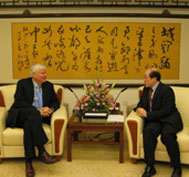 Mr. Friedman’s “But not enough” is no doubt still all too true. (And a related point he made about the growth of transportation infrastructure in the United States and Canada is nicely underlined by recent Obama administration “visions” of 10 new high-speed rail corridors in the United States — two of which actually involve Canadian as well as US cities: in the Pacific Northwest [Eugene, Portland, Tacoma, Seattle, Vancouver BC], and Northern New England [Boston, Montreal, Portland, Springfield, New Haven, Albany].) Mr. Friedman’s “But not enough” is no doubt still all too true. (And a related point he made about the growth of transportation infrastructure in the United States and Canada is nicely underlined by recent Obama administration “visions” of 10 new high-speed rail corridors in the United States — two of which actually involve Canadian as well as US cities: in the Pacific Northwest [Eugene, Portland, Tacoma, Seattle, Vancouver BC], and Northern New England [Boston, Montreal, Portland, Springfield, New Haven, Albany].)
At the same time, it is a bit intriguing in this context to note that the percentage share of all Canadian goods exports destined for the United States has in fact been declining somewhat in the more recent past. According to the usual Statistics Canada data on the subject, some 82% of all Canadian goods exports went to the United States in 2003. By 2008 the share had dropped to 76%. (And by February 2009 it was down still further, to 73%.) Over the same period the shares of Canadian goods exports to all other major trading partners, except Japan, had inevitably increased. And the increase was especially prominent in the case of so-called “Other Countries” (which include China and India).
It would of course be wrong for anyone who wants to try thinking bigger about Canadian international trade, beyond the USA, to become too enthusiastic about these trends. They no doubt reflect the growing diversification of the world economy — and perhaps even some degree of tightening at the Canada-US border, as a result of rising security concerns since 9/11 and all that. Yet as a Financial Post report from just this past February revealed [in the Saskatoon Star Phoenix]: “Ottawa moves to lessen US dependence ... Businesses Rattled ... Canada is in the midst of a wave of free-trade negotiations that could soon include the European Union, hopefully India and possibly Japan, in a high-speed effort to wean exporters off their entrenched dependence on the United States. But even as Ottawa opens doors, exporters appear reluctant to carry the expense of establishing themselves in distant markets.”
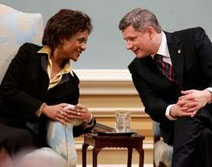 Still more recent intelligence from the Globe and Mail [April 27] reveals that “EU approves free-trade talks with Canada ... The European Union endorsed plans today to open negotiations with Canada on a new free-trade pact ... The negotiations, which could last two years, are to be officially launched at an EU-Canada leaders summit May 6, in Prague ... Quebec Premier Jean Charest, a main proponent of closer Canada ties with Europe, has said a trade deal is the best way to protect jobs and to counterbalance Canada's dependence on the US market.” Still more recent intelligence from the Globe and Mail [April 27] reveals that “EU approves free-trade talks with Canada ... The European Union endorsed plans today to open negotiations with Canada on a new free-trade pact ... The negotiations, which could last two years, are to be officially launched at an EU-Canada leaders summit May 6, in Prague ... Quebec Premier Jean Charest, a main proponent of closer Canada ties with Europe, has said a trade deal is the best way to protect jobs and to counterbalance Canada's dependence on the US market.”
On this kind of evidence, it is no doubt arguable enough that striving for a somewhat less-US-dependent trade policy is one area where the present Harper Conservative minority government has tried to help build a stronger Canada for the 21st century — and to think at least somewhat bigger about the Canadian future.
Mr. Harper’s government, however, does not seem to be making much noise about this side of its current ambitions. And, in a longstanding Canadian Grit tradition of stealing good ideas from any other party that has such things, it could make a lot of sense for the rising Ignatieff Liberals to just take over and turn up the volume on all this — especially the part about “free-trade negotiations that could soon include ... hopefully India and possibly Japan.”
(Let the Tories take credit for trying to revive Pierre Trudeau’s old failed “Third Option” in continental Europe. The Grits can finally lead the way into the various rising and much more forward-looking new tiger relams of Asia. And here present-day Canadian business people with Asian backgrounds and connections may not be quite so reluctant to “carry the expense of establishing themselves in distant markets.”)
Thinking big on Canadian regionalism ... a version of Senate reform that could work for Ontario and Quebec too????
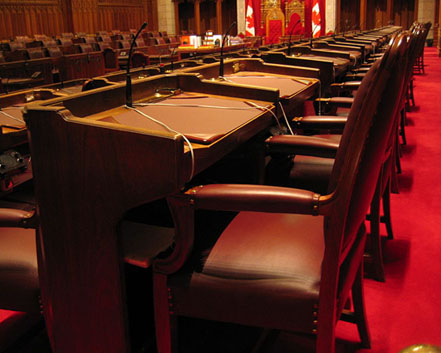 Recent opinion polls do appear to be showing stronger support for the federal Liberals under Michael Ignatieff than they managed to garner in last fall’s general election, under Stephane Dion. But they still don’t show any potential for the kind of majority of seats in the Ottawa Parliament that also continues to elude Stephen Harper’s Conservatives. Recent opinion polls do appear to be showing stronger support for the federal Liberals under Michael Ignatieff than they managed to garner in last fall’s general election, under Stephane Dion. But they still don’t show any potential for the kind of majority of seats in the Ottawa Parliament that also continues to elude Stephen Harper’s Conservatives.
The continuing great Achilles’ heel of even the Ignatieff Liberals is their inability to make serious headway in Western Canada. Especially the three Prairie Provinces (with special but not exclusive emphasis on Alberta) remain a staunch Conservative bastion. And while British Columbia on Canada’s enchanting Pacific Coast is less staunchly Conservative, it also more prominently splits its progressive vote between Liberals and New Democrats than other parts of the country — and certainly than Ontario these days. (To jump to perhaps related strands of provincial politics at the moment, there now seems some at least [very?] slight chance that before the next federal election both British Columbia on the Pacific Coast and Nova Scotia on the Atlantic Coast will have NDP provincial governments!)
One think-big approach that might help the Liberals here would be to steal another cluster of current Harper Conservative policy favourites. The attractive Tory MILF in this case (if that’s not too crude a way of putting it?) is the sopmewhat tarnished Harperian chalice of “step-by-step” Senate reform — including the plans for reducing senatorial terms and having “consultative” elections for Senate seats (without constitutional amendments), already gathering dust in proposed legislation that only the current Conservative minority in Parliament will support.
It would of course not be good enough for the Ignatieff Liberals to just steal the current Tory think-big Senate reform plans outright. (And besides if they did this they would have to explain why they didn’t support the same big ideas when the Tories first proposed them?) The Grits would need to blend these plans with their own ideas about provincial representation in a reformed Senate that would work for Ontario and Quebec, at the same time that they at last gave some proper regional balance for less populous provinces in federal institutions. And in the interest of saving time here we just point to some preliminary concepts of just this sort, advanced by our colleague Randall White in a Globe and Mail web-exclusive comment piece from a few years ago now!.
Thinking big on the ultimate sovereignty of the Canadian people at last ... getting ready for the end of the British monarchy in Canada ...
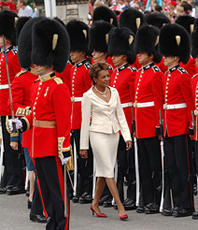 Finally, legend has it that in the late 1990s Jean Chrietien’s Liberal government in Ottawa actually explored the prospect of politely waving goodbye to the British monarchy in Canada, as a way of celebrating the new millennium in the true north, strong and free. The project was set aside when consultations with a few provincial premiers suggested that not all provincial legislatures would approve — as would be required for the requisite constitutional amendment under the Constitution Act 1982. Finally, legend has it that in the late 1990s Jean Chrietien’s Liberal government in Ottawa actually explored the prospect of politely waving goodbye to the British monarchy in Canada, as a way of celebrating the new millennium in the true north, strong and free. The project was set aside when consultations with a few provincial premiers suggested that not all provincial legislatures would approve — as would be required for the requisite constitutional amendment under the Constitution Act 1982.
A decade or so later, however, times have at least begun to change. According to recent opinion polls by Angus Reid Strategies, some 55% of Canadians supported Canada’s ending its formal ties to the British monarchy in February 2008, up from 53% in September 2007, while only 34% opposed this option outright, down from 35% in 2007.
To demonstrate a forward-looking capacity to think big on this strictly symbolic but nonetheless quite fundamental issue, dealing with the ultimate sovereignty of the Canadian people in Canada today, it would not be necessary for the Liberals to promise to end Canada’s formal ties with the British monarchy right now. They could, e.g., simply declare their interest in ending these ties when the reign of the present monarch (who is still admired by at least many if very far from all Canadians) comes to an end.
And/or they could declare their interest in exploring options for replacing the British monarchy when the reign of the present incumbent does come to an end. (In the interest of saving time here we would just point to some preliminary concepts of this sort, advanced by our colleague Randall White in a Toronto Star article from just a few days ago.) The Liberals might even declare their intention to hold a federal-provincial conference on the matter, or — irony of all ironies — a royal commission!
* * * *
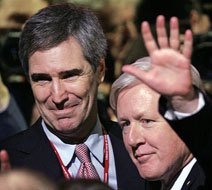 Our point here of course is not that the historic Liberal Party of Canada assembled in convention at Vancouver April 30–May2, 2009 is likely to do any of the various big things suggested above. It is just that if they really wanted to show some courage and boldness and big thinking about the Canadian future, they could. Our point here of course is not that the historic Liberal Party of Canada assembled in convention at Vancouver April 30–May2, 2009 is likely to do any of the various big things suggested above. It is just that if they really wanted to show some courage and boldness and big thinking about the Canadian future, they could.
There are a few last touches that do need to be put on the longstanding and ever-so-gradually-achieved nation building project in Canada. If you do worry even a little about the Canadian future in the 21st century, it is hard to see how they are not important.
Of course it is customary for pundits to say that the electorate is bored by such things and not at all interested. And yet the Ottawa Liberals of the 1960s and 1970s and earlier 1980s managed to do what they did manage to do more practically, from public health care to the Charter of Rights, partly because Lester Pearson pushed through the compelling symbol of an independent Canadian flag in 1965.
In any case, are there any signs that the Liberals at their 2009 Convention in Vancouver are going to show any signs at all of thinking big? We would welcome any inklings of this sort, and will be keeping our eyes wide open. But we’re certainly not holding our breath. As Lysiane Gagnon has said about Mr. Ignatieff himself: “We’ll see.”
Only registered users can write comments.
Please login or register. Powered by AkoComment 1.0 beta 2!
|
